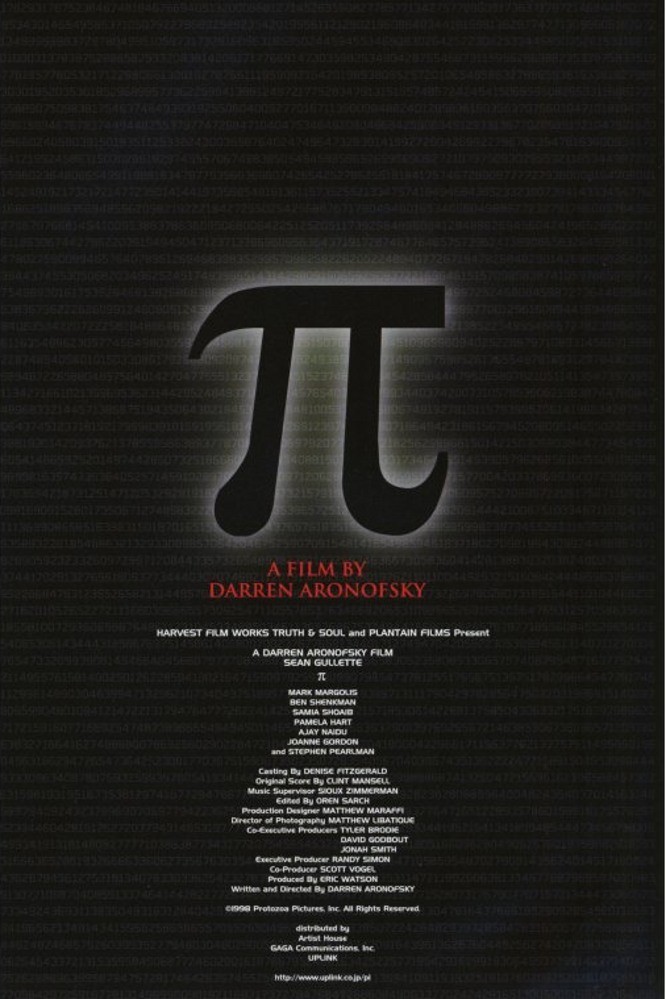The film “Pi” is a study in madness and its partner, genius. A tortured, driven man believes (1) that mathematics is the language of the universe, (2) nature can be expressed in numbers, and (3) there are patterns everywhere in nature. If he can find the patterns, if he can find the key to the chaos, then he can predict anything–the stock market, for example. If the man is right, the mystery of existence is unlocked. If he is wrong, the inside of his brain begins to resemble a jammed stock ticker.
The movie, written and directed by Darren Aronofsky, is a study in mental obsession. His hero, named Maximillian Cohen, lives barricaded behind a triple-locked door, in a room filled with high-powered, customized computer equipment. He wants nothing to do with anybody. He writes programs, tests them, looks for the pattern, gets a 216-digit bug, stomps on his chips in a rage, and then begins to wonder about that bug. Exactly 216 digits. There is a theory among some Jewish scholars, he learns, that the name of God has 216 letters.
The movie is shot in rough, high-contrast black and white. Max, played by Sean Gullette, is balding, restless, paranoid and brilliant. He has debilitating headaches and nosebleeds. Symptoms of high blood pressure–or of the mental torment he’s putting himself through. He’s suspicious of everyone. The friendly Indian woman next door puts food by his door. He avoids her. He trusts only his old teacher, Sol (Mark Margolis). They play Go, a game deeper than chess, and Sol tells him to stop with the key to the universe business, already. He warns that he’s spinning away from science and toward numerology.
Not everybody thinks so. His phone rings with the entreaties of Marcy (Pamela Hart), who works for a high-powered Wall Street analysis firm. They want to hire him as a consultant. They think he’s onto something. He has predicted some prices correctly. At the deli, he runs into a Hasidic Jew named Lenny (Ben Shenkman), who seems casual and friendly but has a hidden mission: His group believes the Torah may be a code sent from God and may contain God’s name.
Of course if one finds the mathematical key to everything, that would include God, stock prices, the weather, history, the future, baseball scores and the response to all moves in Go. That assumes there is a key. When you’re looking for something that doesn’t exist, it makes you crazier the closer you get to it.
The seductive thing about Aronofsky’s film is that it is halfway plausible in terms of modern physics and math. What was numerology a century ago now has now been simplified into a very, very vast problem. Chaos theory looks for patterns where common sense says there are none. A computer might be able to give you the answer to anything, if (1) it is powerful enough, and (2) it has all the data. Of course, you might need a computer the size of the universe and containing everything in it, but we’re talking theory here.
“Pi” is a thriller. I am not very thrilled these days by whether the bad guys will get shot or the chase scene will end one way instead of another. You have to make a movie like that pretty skillfully before I care. But I am thrilled when a man risks his mind in the pursuit of a dangerous obsession. Max is out on a limb. There are hungry people circling him. He may be on to something. They want it, too. For both the stock market people and the Hasidic cabal, Max’s formula represents all they believe in and everything they care about.
And then there is a level at which Max may simply be insane, or physically ill. There are people who work out complicated theories involving long, impenetrable columns of numbers. Newspapers get envelopes filled with their proofs every day. And other people who sit in their rooms, wrapping themselves in the webs of chess or numbers theory, addicted to their fixes. And game players, gamblers, horseplayers–people bewitched by the mirage of a system.
The beautiful thing about mathematics is that you can’t prove it except by its own terms. There’s no way to put some math in a test tube and see if it turns purple or heats up. It sits there smugly in its own perfect cocoon, letting people like Max find anything he wants in it–or to think that he has.



















